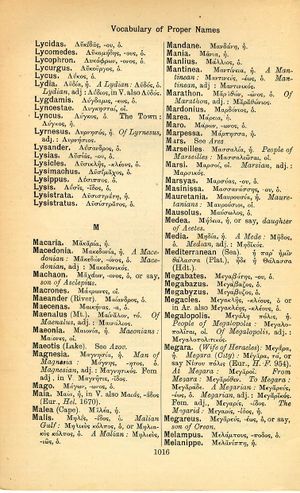Medea
Οὐκ ἔστιν οὐδείς, ὅστις οὐχ αὑτῷ φίλος → Nemo est, amicus ipse qui non sit sibi → Den gibt es nicht, der nicht sich selber wäre Freund
English > Greek (Woodhouse)
Μήδεια, ἡ, or say, daughter of Aeetes.
Latin > English (Lewis & Short)
Mēdēa: ae (arch.
I gen. Medeaï, Enn. ap. Cic. Tusc. 3, 26, 63; v. Enn. p. 127, v. 292 Vahl.; nom. Mēdē, acc. to id. p. 130, v. 311 Vahl.), and Mēdīa, f., = Μήδεια, a celebrated sorceress, daughter of Æetes, king of Colchis. She assisted her lover, Jason the Argonaut, in obtaining the golden fleece, accompanied him to Greece, and prevented her father, who was in pursuit, from overtaking them, by strewing the sea with her brother's limbs. When Jason afterwards repudiated her, in order to marry Creusa, she killed the children she had had by him, and burned the bride to death in her palace: item ut Medea Peliam concoxit senem, Plaut. Ps. 3, 2, 52; Ov. M. 7, 9 sqq.; Hyg. Fab. 21, 22, 25: ne pueros coram populo Medea trucidet, Hor. A. P. 185.—The subject of tragedies by several authors, v. Quint. 10, 1, 98.—
B Transf.
1 Medea Palatina, i. e. Clodia, Cic. Cael. 8, 18.—
2 Medea nigra, a precious stone, so named after Medea, Plin. 37, 10, 63, § 173.—Hence,
II Mēdēis, ĭdis, f. adj., Medean, magical (poet.): Medeides herbae, Ov. A. A. 2, 101.

